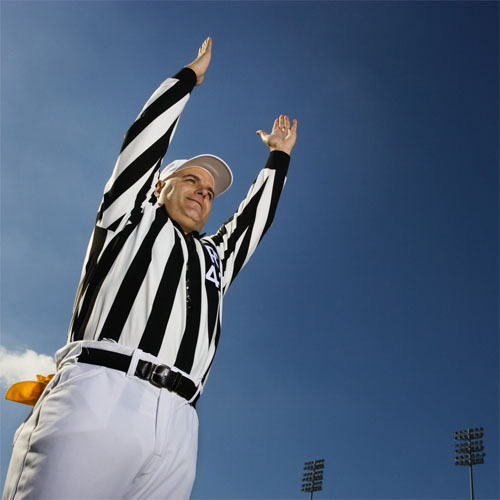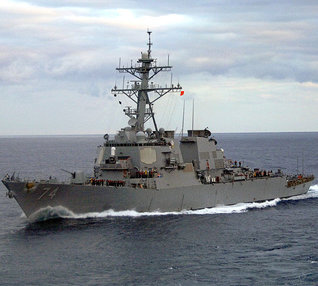
Zebra
Somewhere in, NJ
Male, 62
I've officiated football for over 30 years, now in my 26th on the college level. I've worked NCAA playoffs at the Division II and III level. In addition, I've coached at the scholastic level and have been an educator for over 35 years. I have no interest whatsoever in being an NFL official! Ever!
No. Only a player - someone in the game/on the field - or a substitute - someone coming on to the field to replace a player - can call tmieout.
Blocking downfield seems to indicate you're looking at offensive pass interference. In college, pass interference only occurs when a legal forward pass crosses the line of scrimmage. If a pass is caught behind the line, it obviously hasn't crossed the line of scrimmage. If it's a backward pass (no such thing as a lateral) then it isn't forward and you can't have OPI.
At least in college, it is illegal. For safety reasons. A trainer needs to be able to see a player's eyes if they are hurt. If a helmet can't be removed (e.g. possible neck injury) the eyes will help determine consciousness.
Nope. The player is ineligible by number and that is always the case on a pass that crosses the line of scrimmage.
CBP Officer
 Why are so many customs officers huge jerks?
Why are so many customs officers huge jerks?
Navy Officer (Former)
 Just how educated is the typical US military serviceman?
Just how educated is the typical US military serviceman?
Claims Adjuster
I don't know. That is an NFL policy or regulation dealing with the structure of the league. I have a hard enough time understanding the playing rules. Sorry.
A fumble is a fumble, not a backwards pass. That being said, they're both still alive for a defensive score.
It's pretty similar at all levels of play. The big difference in the NFL and at the higher levels of college ball is the "O2O" (official-to-official) communication - the headsets. The official who threw the flag has to communicate to the referee what the foul is. Most times, the coach knows what it is, but the nearest official - one on the sideline - will try to get him the information if it isn't clear. The penalty also should be communicated so the coach understands his options. You'll often see the referee look to the sideline and signal the foul and possibly the decline signal if it seems appropriate) with a questioning look; he's communicating with the coach - the head coach. Any official who takes a response from an assistant in that situation is....uhh, not very smart.
-OR-
 Login with Facebook
Login with Facebook (max 20 characters - letters, numbers, and underscores only. Note that your username is private, and you have the option to choose an alias when asking questions or hosting a Q&A.)
(A valid e-mail address is required. Your e-mail will not be shared with anyone.)
(min 5 characters)
By checking this box, you acknowledge that you have read and agree to Jobstr.com’s Terms and Privacy Policy.
-OR-
 Register with Facebook
Register with Facebook(Don't worry: you'll be able to choose an alias when asking questions or hosting a Q&A.)